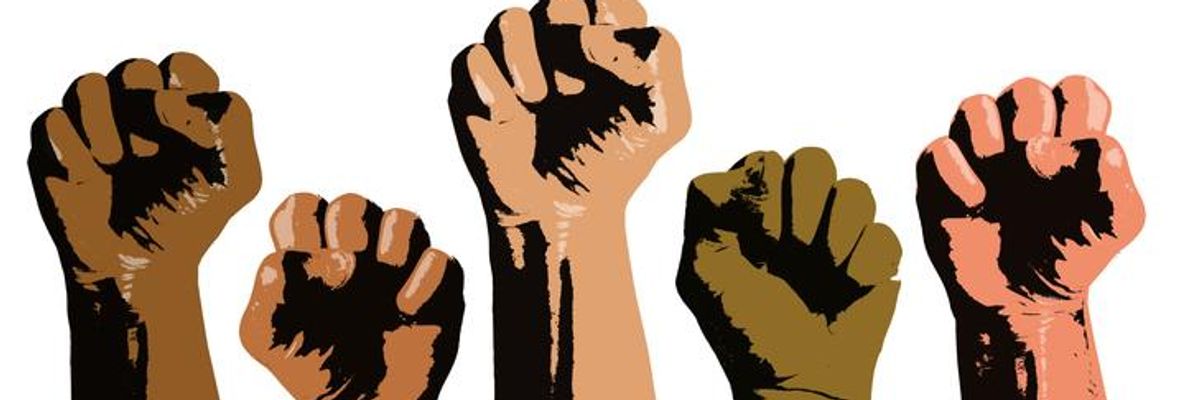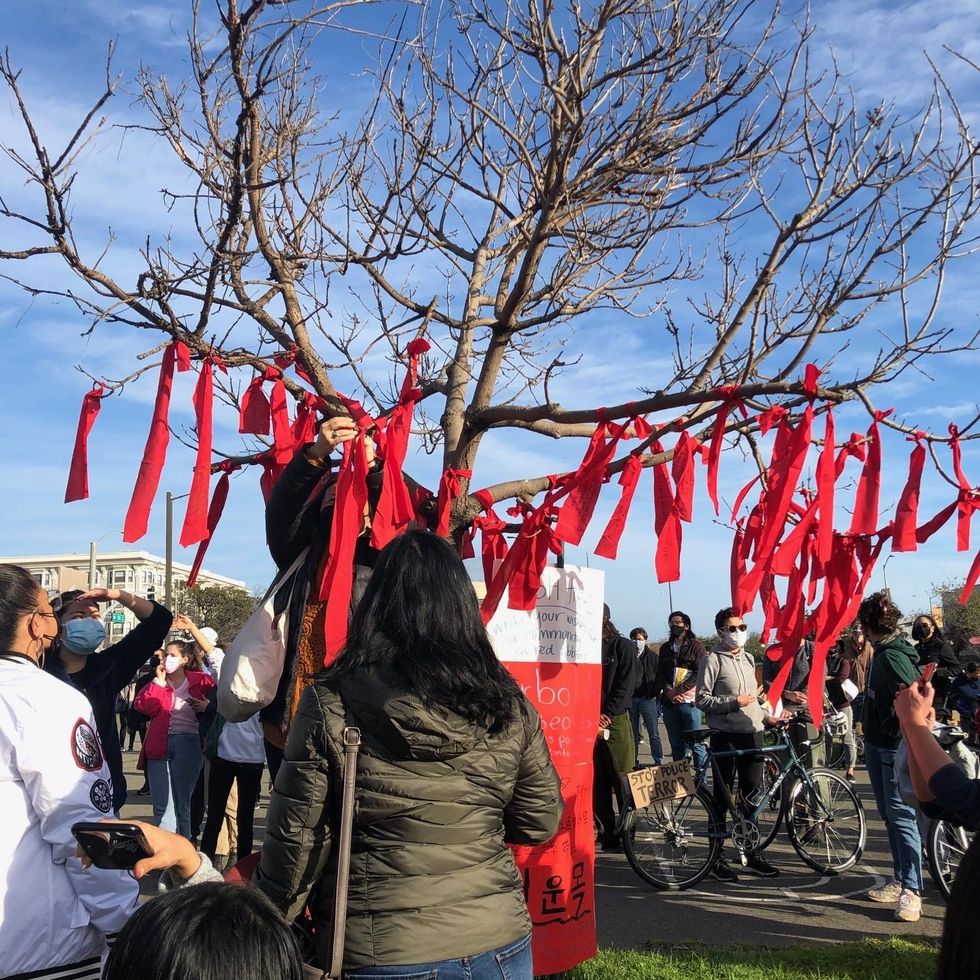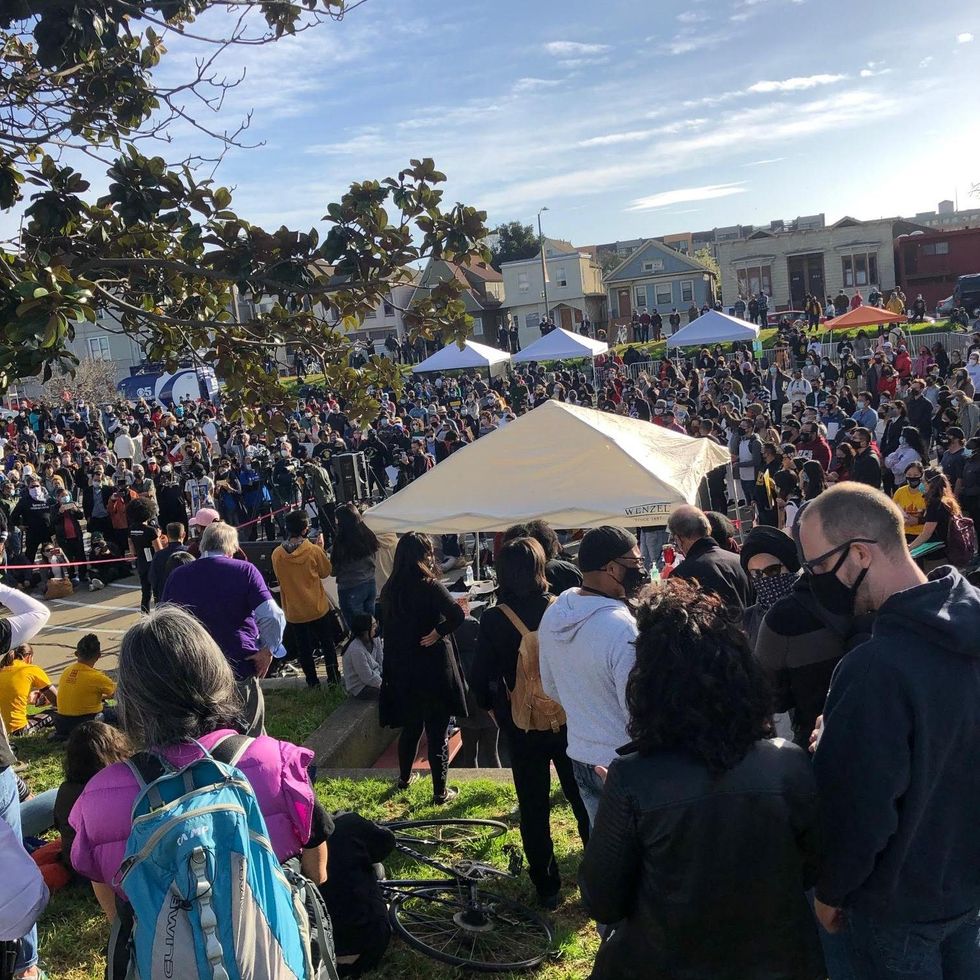
We must reject the siren call of supremacy--that would put one group down to elevate our own--and the forces that would divide us. (Photo: Getty/ Stock Photo/ smartboy10)
To donate by check, phone, or other method, see our More Ways to Give page.

We must reject the siren call of supremacy--that would put one group down to elevate our own--and the forces that would divide us. (Photo: Getty/ Stock Photo/ smartboy10)
In a country that celebrates its President's Day as a federal holiday that commemorates the former U.S. presidents' achievements and sacrifices, that holiday also reminds us of the many contradictions that we grapple with about these men (and they are all men) who worked to build a country while brutally oppressing so many people of color. This ever-present oppression against communities of color has also bonded our communities in interconnected struggles, even as we face new threats.
Since President Trump initially stoked the flames of hatred against Asian Americans at the start of the pandemic to deflect blame from his administration's failed response, data from Stop AAPI Hate show growing incidence of anti-Asian violence that are likely vastly under-reported.
But recent events have also recalled historic tensions between Black and Asian American communities, with politicians seeking to sow further division between our communities by dishonestly pointing to demands to defund the police as the reason for the rise anti-Asian crimes.
We cannot let this violence define our communities' relationship with each other and tear us down or tear us apart. We must condemn the violence against our elders, queer and trans people, women, young people, and people with disabilities.
To be clear, there is fear in the Asian American community and that fear is real. And there is fear in the Black community over cries of more policing. And that fear is real too. Violence against both communities is reprehensible and should have no place in our world. But more policing is not the answer. We must train our eyes on the true enemy: white supremacy in all its forms.


A system that creates billionaires with wealth that goes unchecked while communities of color continue to carry a disproportionate burden of poverty is an expression of white supremacy. A system that would limit where one can live based on our race and force us to live apart rather than to build relationships across our differences is an expression of white supremacy. And a system that fails to hold accountable a President and his enablers after inciting a violent mob to destroy democracy is an act of white supremacy.
We must reject the siren call of supremacy--that would put one group down to elevate our own--and the forces that would divide us. We reject these notions of scarcity, individualism, makers and takers, and taxpayers and freeloaders. We must find a new path forward based on an active love of one another and a recognition of our shared humanity. This conscious act of love would move us toward action to dismantle the systems of oppression that would force communities of color to fight over scarce resources rather than to create new systems in which all of us share in the prosperity of our nation.
This past weekend, I participated in a rally in Oakland, California organized by a multi-racial group of organizations in San Francisco and Oakland where the speakers fervently prayed that we urgently seek peace, solidarity and changed hearts. The rally reminded me of the words of Grace Lee Boggs in her book, The Next American Revolution: "We need to bring to our communities the limitless capacity to love, serve, and create for and with each other. We urgently need to bring the neighbor back into our hoods, not only in our inner cities but also in our suburbs, our gated communities, on Main Street and Wall Street." At the rally we found a collective solace in the diversity of faces and compassionate voices who called for "Love Our People, Heal Our Communities.".
We understand that the "model minority" myth allows a segment of White America to avoid any responsibility for addressing racism or the damage it continues to inflict. Many White people try to use Asian Americans and their perceived collective success as a racial wedge. We reject this argument.
Our history tells us that our Black and Asian communities are not monoliths but that our complex histories of both anti-Blackness and anti-racism solidarity are joined together. Black communities wrote letters and sent food to Japanese people in internment camps and Filipino and Chinese organizers in the Bay Area were inspired by the Black Panther Party. Oppression is multifaceted and affects many people, and only by working together can racial and cultural oppression be overcome.
The Greenlining Institute stands in solidarity with Bay Area Asian-American organizations working to "invest in long-term community centered solutions that call for cross-racial healing that address underlying causes and create ways for all to thrive." Let us continue the legacy of past and present Asian and Black solidarity from activists like Grace Lee Boggs with the Detroit Black Panther movement, Yuri Kochiyama and her association with Malcolm X and the Buffalo soldiers who defected from the U.S. army in support of Philippine independence.
Our interconnected struggles are built on Asian and Black solidarity, embracing an understanding that we must condemn anti-Asian hate and violence and also condemn violence against Black people.
The only way to survive this tragic chapter in our communities is to take care of one another through compassion and love in action.
Trump and Musk are on an unconstitutional rampage, aiming for virtually every corner of the federal government. These two right-wing billionaires are targeting nurses, scientists, teachers, daycare providers, judges, veterans, air traffic controllers, and nuclear safety inspectors. No one is safe. The food stamps program, Social Security, Medicare, and Medicaid are next. It’s an unprecedented disaster and a five-alarm fire, but there will be a reckoning. The people did not vote for this. The American people do not want this dystopian hellscape that hides behind claims of “efficiency.” Still, in reality, it is all a giveaway to corporate interests and the libertarian dreams of far-right oligarchs like Musk. Common Dreams is playing a vital role by reporting day and night on this orgy of corruption and greed, as well as what everyday people can do to organize and fight back. As a people-powered nonprofit news outlet, we cover issues the corporate media never will, but we can only continue with our readers’ support. |
In a country that celebrates its President's Day as a federal holiday that commemorates the former U.S. presidents' achievements and sacrifices, that holiday also reminds us of the many contradictions that we grapple with about these men (and they are all men) who worked to build a country while brutally oppressing so many people of color. This ever-present oppression against communities of color has also bonded our communities in interconnected struggles, even as we face new threats.
Since President Trump initially stoked the flames of hatred against Asian Americans at the start of the pandemic to deflect blame from his administration's failed response, data from Stop AAPI Hate show growing incidence of anti-Asian violence that are likely vastly under-reported.
But recent events have also recalled historic tensions between Black and Asian American communities, with politicians seeking to sow further division between our communities by dishonestly pointing to demands to defund the police as the reason for the rise anti-Asian crimes.
We cannot let this violence define our communities' relationship with each other and tear us down or tear us apart. We must condemn the violence against our elders, queer and trans people, women, young people, and people with disabilities.
To be clear, there is fear in the Asian American community and that fear is real. And there is fear in the Black community over cries of more policing. And that fear is real too. Violence against both communities is reprehensible and should have no place in our world. But more policing is not the answer. We must train our eyes on the true enemy: white supremacy in all its forms.


A system that creates billionaires with wealth that goes unchecked while communities of color continue to carry a disproportionate burden of poverty is an expression of white supremacy. A system that would limit where one can live based on our race and force us to live apart rather than to build relationships across our differences is an expression of white supremacy. And a system that fails to hold accountable a President and his enablers after inciting a violent mob to destroy democracy is an act of white supremacy.
We must reject the siren call of supremacy--that would put one group down to elevate our own--and the forces that would divide us. We reject these notions of scarcity, individualism, makers and takers, and taxpayers and freeloaders. We must find a new path forward based on an active love of one another and a recognition of our shared humanity. This conscious act of love would move us toward action to dismantle the systems of oppression that would force communities of color to fight over scarce resources rather than to create new systems in which all of us share in the prosperity of our nation.
This past weekend, I participated in a rally in Oakland, California organized by a multi-racial group of organizations in San Francisco and Oakland where the speakers fervently prayed that we urgently seek peace, solidarity and changed hearts. The rally reminded me of the words of Grace Lee Boggs in her book, The Next American Revolution: "We need to bring to our communities the limitless capacity to love, serve, and create for and with each other. We urgently need to bring the neighbor back into our hoods, not only in our inner cities but also in our suburbs, our gated communities, on Main Street and Wall Street." At the rally we found a collective solace in the diversity of faces and compassionate voices who called for "Love Our People, Heal Our Communities.".
We understand that the "model minority" myth allows a segment of White America to avoid any responsibility for addressing racism or the damage it continues to inflict. Many White people try to use Asian Americans and their perceived collective success as a racial wedge. We reject this argument.
Our history tells us that our Black and Asian communities are not monoliths but that our complex histories of both anti-Blackness and anti-racism solidarity are joined together. Black communities wrote letters and sent food to Japanese people in internment camps and Filipino and Chinese organizers in the Bay Area were inspired by the Black Panther Party. Oppression is multifaceted and affects many people, and only by working together can racial and cultural oppression be overcome.
The Greenlining Institute stands in solidarity with Bay Area Asian-American organizations working to "invest in long-term community centered solutions that call for cross-racial healing that address underlying causes and create ways for all to thrive." Let us continue the legacy of past and present Asian and Black solidarity from activists like Grace Lee Boggs with the Detroit Black Panther movement, Yuri Kochiyama and her association with Malcolm X and the Buffalo soldiers who defected from the U.S. army in support of Philippine independence.
Our interconnected struggles are built on Asian and Black solidarity, embracing an understanding that we must condemn anti-Asian hate and violence and also condemn violence against Black people.
The only way to survive this tragic chapter in our communities is to take care of one another through compassion and love in action.
In a country that celebrates its President's Day as a federal holiday that commemorates the former U.S. presidents' achievements and sacrifices, that holiday also reminds us of the many contradictions that we grapple with about these men (and they are all men) who worked to build a country while brutally oppressing so many people of color. This ever-present oppression against communities of color has also bonded our communities in interconnected struggles, even as we face new threats.
Since President Trump initially stoked the flames of hatred against Asian Americans at the start of the pandemic to deflect blame from his administration's failed response, data from Stop AAPI Hate show growing incidence of anti-Asian violence that are likely vastly under-reported.
But recent events have also recalled historic tensions between Black and Asian American communities, with politicians seeking to sow further division between our communities by dishonestly pointing to demands to defund the police as the reason for the rise anti-Asian crimes.
We cannot let this violence define our communities' relationship with each other and tear us down or tear us apart. We must condemn the violence against our elders, queer and trans people, women, young people, and people with disabilities.
To be clear, there is fear in the Asian American community and that fear is real. And there is fear in the Black community over cries of more policing. And that fear is real too. Violence against both communities is reprehensible and should have no place in our world. But more policing is not the answer. We must train our eyes on the true enemy: white supremacy in all its forms.


A system that creates billionaires with wealth that goes unchecked while communities of color continue to carry a disproportionate burden of poverty is an expression of white supremacy. A system that would limit where one can live based on our race and force us to live apart rather than to build relationships across our differences is an expression of white supremacy. And a system that fails to hold accountable a President and his enablers after inciting a violent mob to destroy democracy is an act of white supremacy.
We must reject the siren call of supremacy--that would put one group down to elevate our own--and the forces that would divide us. We reject these notions of scarcity, individualism, makers and takers, and taxpayers and freeloaders. We must find a new path forward based on an active love of one another and a recognition of our shared humanity. This conscious act of love would move us toward action to dismantle the systems of oppression that would force communities of color to fight over scarce resources rather than to create new systems in which all of us share in the prosperity of our nation.
This past weekend, I participated in a rally in Oakland, California organized by a multi-racial group of organizations in San Francisco and Oakland where the speakers fervently prayed that we urgently seek peace, solidarity and changed hearts. The rally reminded me of the words of Grace Lee Boggs in her book, The Next American Revolution: "We need to bring to our communities the limitless capacity to love, serve, and create for and with each other. We urgently need to bring the neighbor back into our hoods, not only in our inner cities but also in our suburbs, our gated communities, on Main Street and Wall Street." At the rally we found a collective solace in the diversity of faces and compassionate voices who called for "Love Our People, Heal Our Communities.".
We understand that the "model minority" myth allows a segment of White America to avoid any responsibility for addressing racism or the damage it continues to inflict. Many White people try to use Asian Americans and their perceived collective success as a racial wedge. We reject this argument.
Our history tells us that our Black and Asian communities are not monoliths but that our complex histories of both anti-Blackness and anti-racism solidarity are joined together. Black communities wrote letters and sent food to Japanese people in internment camps and Filipino and Chinese organizers in the Bay Area were inspired by the Black Panther Party. Oppression is multifaceted and affects many people, and only by working together can racial and cultural oppression be overcome.
The Greenlining Institute stands in solidarity with Bay Area Asian-American organizations working to "invest in long-term community centered solutions that call for cross-racial healing that address underlying causes and create ways for all to thrive." Let us continue the legacy of past and present Asian and Black solidarity from activists like Grace Lee Boggs with the Detroit Black Panther movement, Yuri Kochiyama and her association with Malcolm X and the Buffalo soldiers who defected from the U.S. army in support of Philippine independence.
Our interconnected struggles are built on Asian and Black solidarity, embracing an understanding that we must condemn anti-Asian hate and violence and also condemn violence against Black people.
The only way to survive this tragic chapter in our communities is to take care of one another through compassion and love in action.